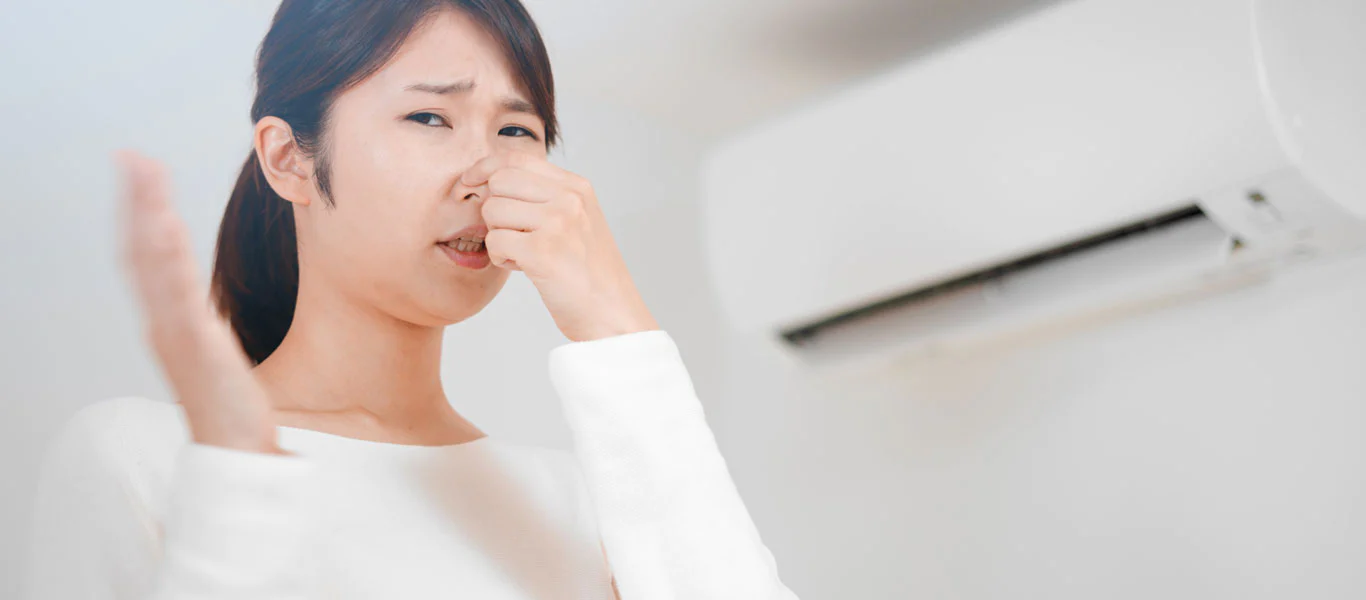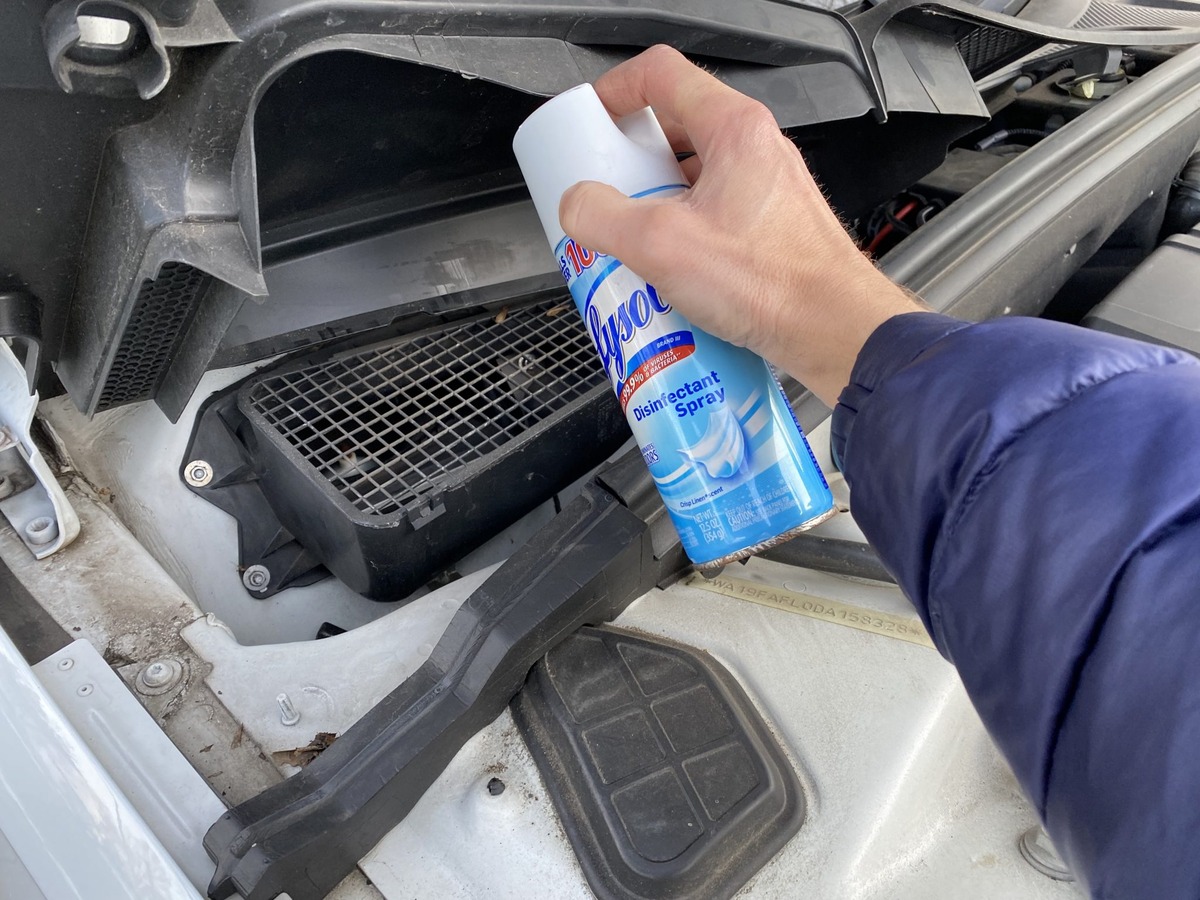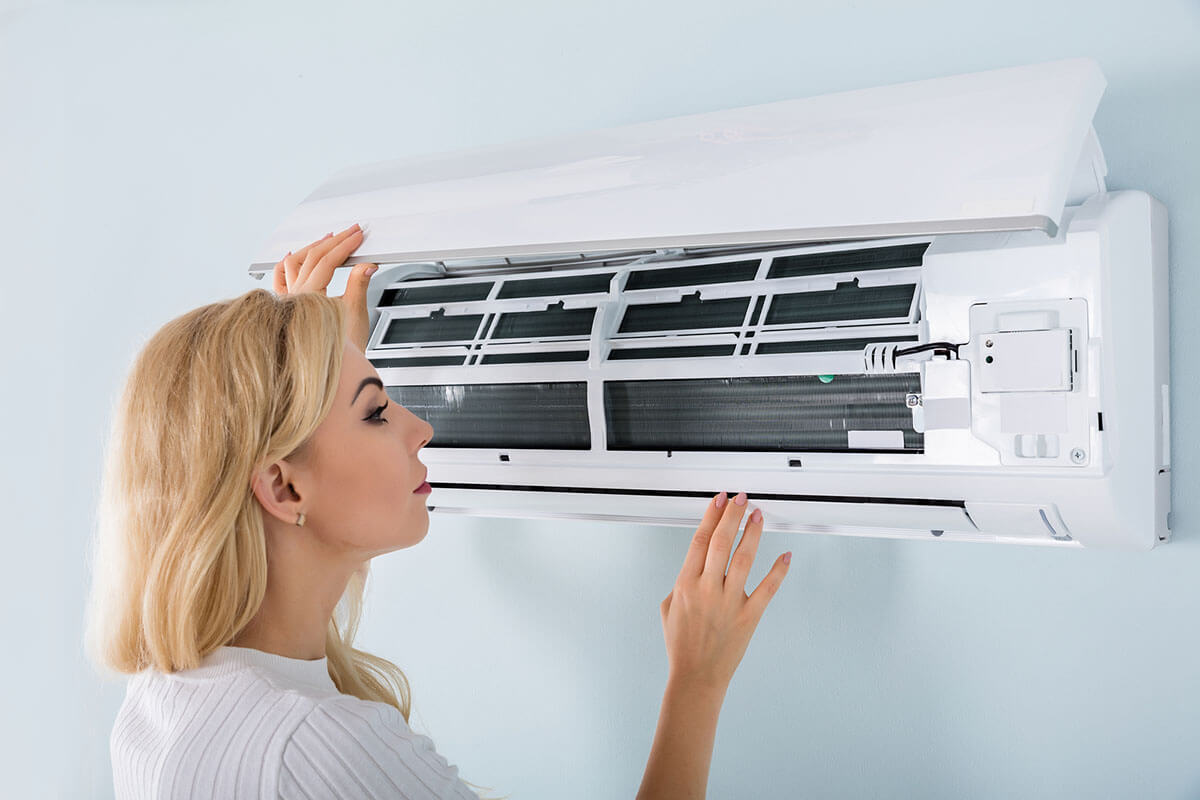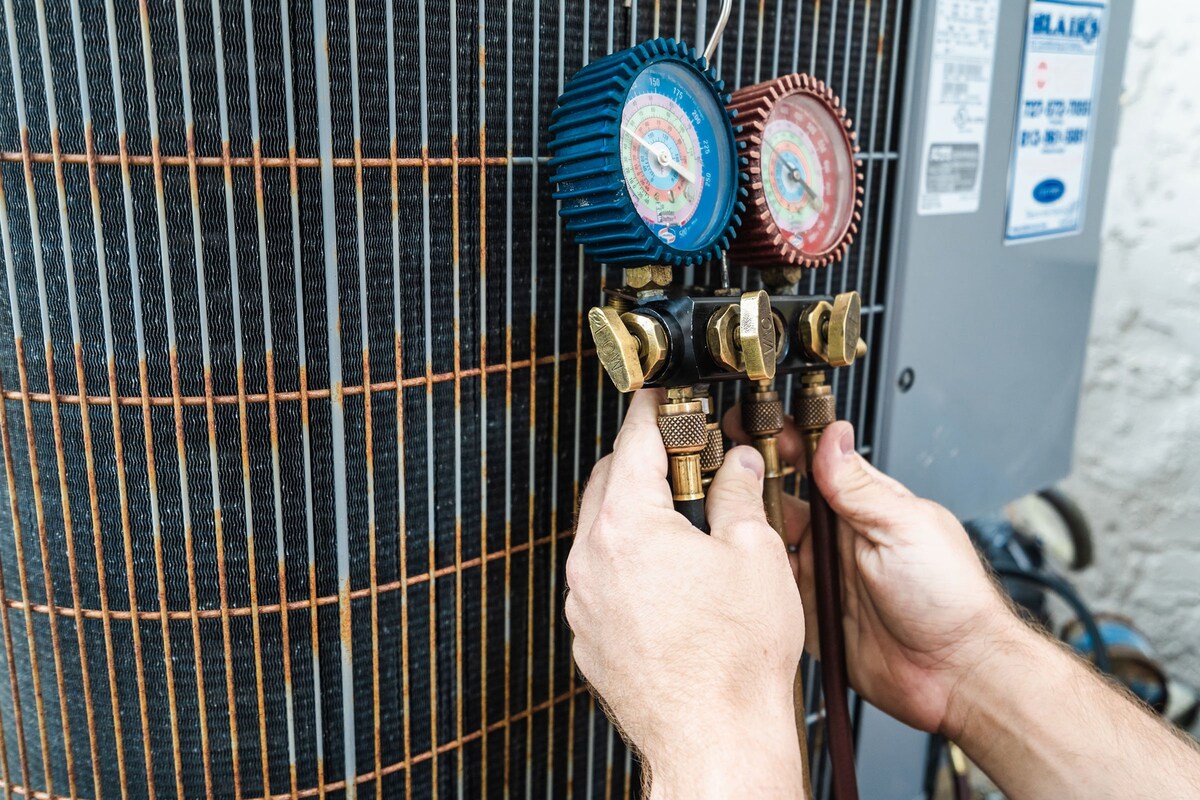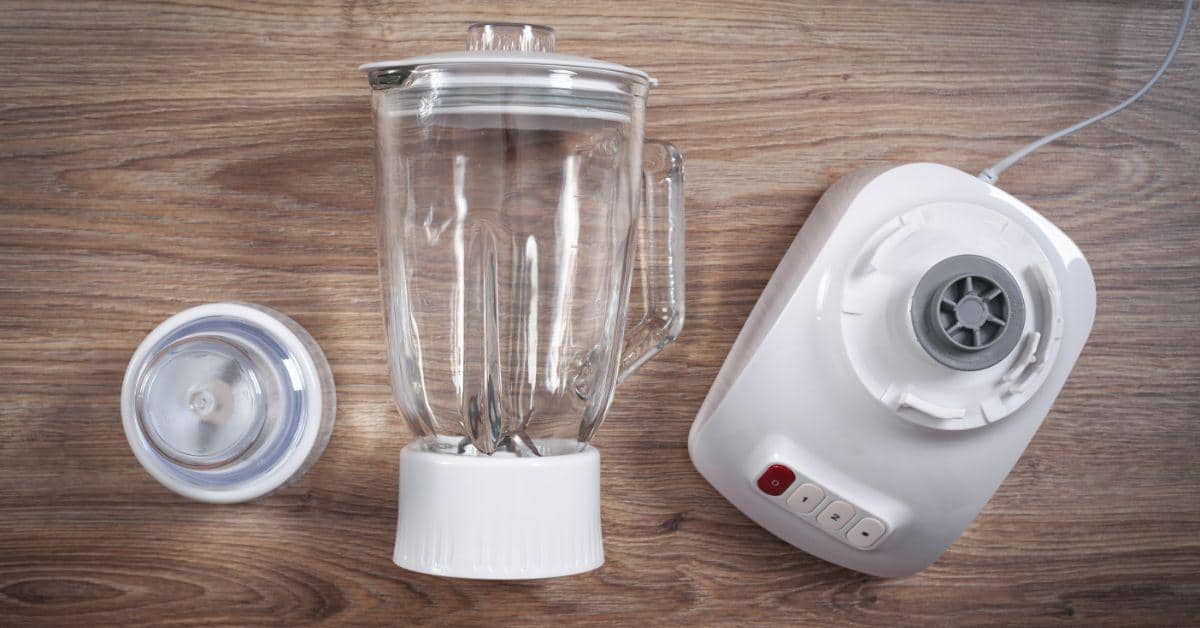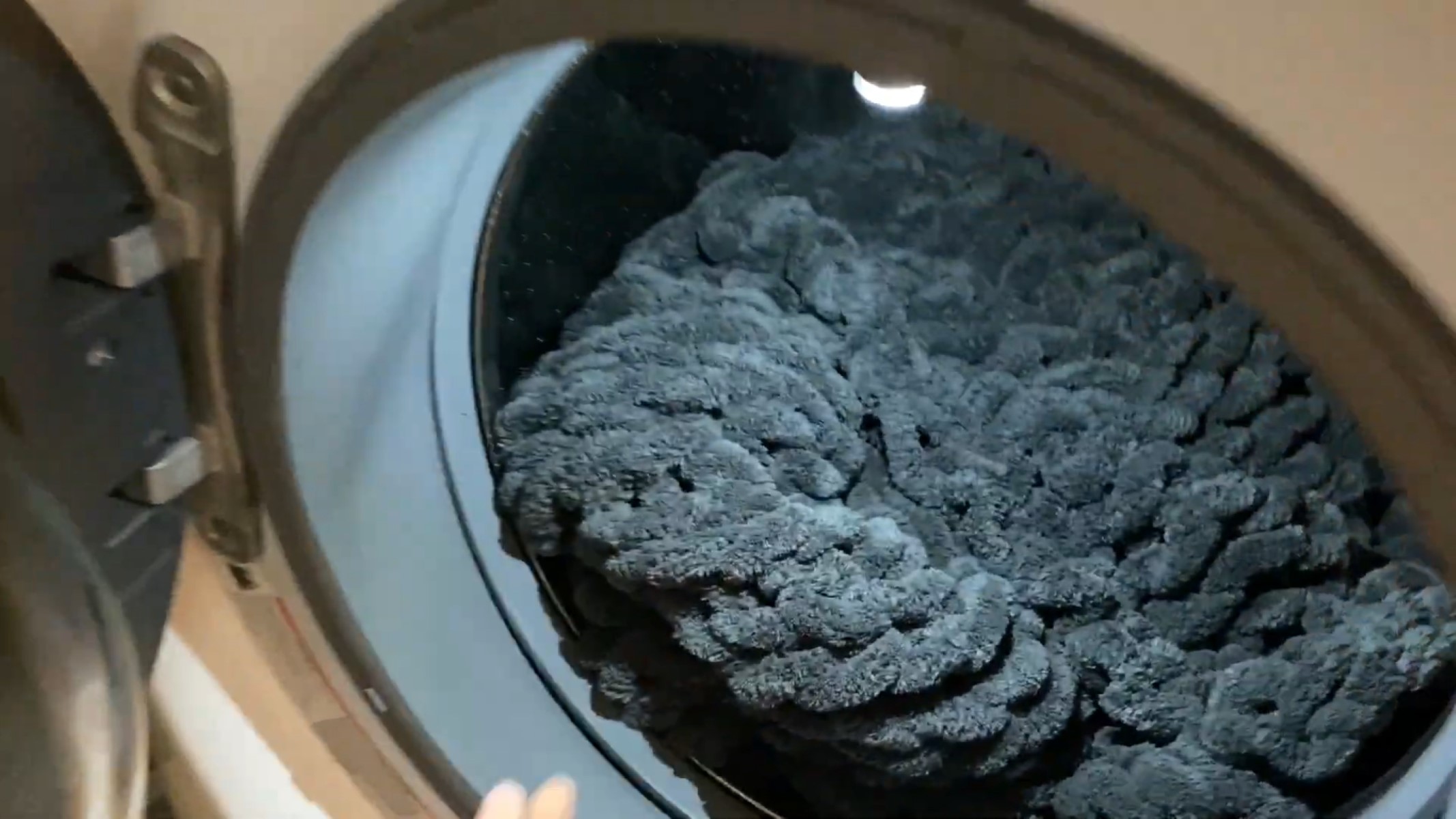Home>Home Maintenance>Why Does My Air Conditioning Smell Musty


Home Maintenance
Why Does My Air Conditioning Smell Musty
Modified: August 27, 2024
Find out why your air conditioning smells musty and learn how to solve it with our home maintenance tips.
(Many of the links in this article redirect to a specific reviewed product. Your purchase of these products through affiliate links helps to generate commission for Storables.com, at no extra cost. Learn more)
Introduction
The comfort of a well-functioning air conditioning system can make all the difference during hot summer months. However, if you notice a musty smell emanating from your air conditioner, it can be rather unpleasant and disrupt the pleasant indoor environment. Understanding the common causes of this musty odor and knowing how to resolve the issue can help ensure that you enjoy clean and fresh air in your home.
There are several reasons why your air conditioning system may emit a musty smell. In most cases, this odor is a result of mold, mildew, or other contaminants that have accumulated within the system over time. The following sections will explore some of the common causes of a musty smell in air conditioning and provide effective solutions to eliminate it.
Key Takeaways:
- Regular maintenance and cleaning of your air conditioning system is crucial to prevent musty odors caused by mold, clogged drain lines, and dirty filters. By addressing these issues, you can enjoy fresh and clean air in your home.
- Reducing humidity, improving ventilation, and clearing clogged drain lines are effective ways to eliminate musty smells in your air conditioning system. These simple steps can help maintain a pleasant indoor environment.
Read more: Why Does AC Smell Musty
Common Causes of Musty Smell in Air Conditioning
1. Mold and Mildew Growth in the AC System:
Mold and mildew thrive in dark, damp environments, making your air conditioning system an ideal breeding ground. If moisture is present inside the system, it can lead to the growth of mold and mildew on the coils, ductwork, or other components. As air passes through the system, it carries the musty smell produced by these microorganisms into your living space.
2. Clogged Condensate Drain Line:
The condensate drain line is responsible for removing excess moisture from your air conditioner. However, over time, this line can become clogged with dirt, debris, or algae. When the drain line is blocked, water accumulates in the system, promoting the growth of bacteria and causing a musty odor.
3. Dirty Air Filters:
The air filters in your HVAC system are designed to trap dust, pollen, and other particles, preventing them from circulating in the air. However, when the filters become dirty and clogged, they can allow mold and mildew to grow. The stagnant air trapped in the filters can produce a musty smell that is then distributed throughout your home.
4. Accumulation of Dust and Debris:
Over time, dust and debris can accumulate on the surfaces of your air conditioning system, including the evaporator coil, blower fan, and ductwork. If left uncleaned, these particles can create a musty odor as they mix with the moisture and humidity in the air.
5. Dampness or Humidity Issues:
If your home has high humidity levels or experiences frequent moisture build-up, it can create a damp environment that promotes the growth of mold and mildew. This dampness can then transfer to your air conditioning system, resulting in a musty smell when the AC is in operation.
By understanding these common causes, you can take proactive measures to eliminate the musty smell and maintain a fresh indoor environment. In the next section, we will explore effective solutions to help you get rid of the unpleasant odor in your air conditioning system.
Mold and Mildew Growth in the AC System
Mold and mildew growth in the air conditioning system is a common cause of a musty smell. As mentioned earlier, these microorganisms thrive in dark, damp environments, making the interior components of the AC system an ideal breeding ground.
The presence of moisture in the system, whether it’s due to condensation or leaks, provides the perfect conditions for mold and mildew to grow. The most common areas where mold and mildew can be found include the evaporator coils, air ducts, and drip pans.
Mold and mildew not only create a musty odor, but they can also have adverse effects on indoor air quality. They release spores into the air, which can cause respiratory issues and allergies, particularly for individuals with asthma or sensitive respiratory systems.
To address mold and mildew growth in your air conditioning system, follow these steps:
Step 1: Turn off the AC and unplug it from the power source for safety.
Step 2: Inspect the evaporator coils, air ducts, and drip pans for signs of mold or mildew. If you notice any visible growth, it is essential to take immediate action.
Step 3: Use an appropriate mold and mildew cleaner to treat the affected areas. Follow the instructions provided on the cleaner’s label to ensure safe and effective use.
Step 4: Clean any accumulated dirt, dust, or debris from the evaporator coils using a soft brush or vacuum cleaner with a brush attachment. It is crucial to remove all contaminants to prevent further mold and mildew growth.
Step 5: Clean and disinfect the drip pans, ensuring that they are free of any standing water or debris that could promote mold and mildew growth.
Step 6: Consider using UV germicidal lights or air purifiers to help prevent future mold and mildew growth in your air conditioning system. These devices use ultraviolet light to kill bacteria, viruses, and mold spores.
Regular maintenance, such as professional cleaning and inspections of your air conditioning system, can also help prevent mold and mildew growth. By keeping your AC system clean and dry, you can minimize the risk of musty odors and improve the overall indoor air quality in your home.
Clogged Condensate Drain Line
A clogged condensate drain line is another common cause of a musty smell in air conditioning systems. The condensate drain line is responsible for removing excess moisture from the AC unit, preventing water buildup and potential damage to the system.
Over time, the drain line can become clogged with dirt, dust, debris, or even algae growth. When this happens, water gets trapped in the system, creating a breeding ground for bacteria and mold. The stagnant water and organic matter produce a musty odor that is then circulated throughout your home.
To address a clogged condensate drain line and eliminate the musty smell, follow these steps:
Step 1: Turn off the air conditioning system to ensure safety and prevent any potential water leakage.
Step 2: Locate the condensate drain line, which is typically a PVC pipe located near the indoor unit of your AC system.
Step 3: Check if there is any visible blockage in the drain line. You may use a flashlight to inspect the pipe for clogs or buildup.
Step 4: If the blockage is visible and accessible, try using a wet/dry vacuum cleaner or a pipe brush to remove the debris. Be cautious and gentle to avoid damaging the pipe.
Step 5: If there is no visible blockage but the line is still clogged, you can try using a mixture of equal parts white vinegar and water. Pour the solution into the drain line to dissolve any accumulated debris or algae. Let it sit for a while before flushing the line with clean water.
Step 6: After clearing the drain line, check for proper water flow by pouring a small amount of water into the pipe. It should flow freely out of the system’s designated drainage area.
Step 7: As a preventive measure, consider installing a condensate drain line cleaning device or regular maintenance to ensure the line remains clear of any future obstructions.
Regularly maintaining and cleaning the condensate drain line is crucial to prevent clogs and the associated musty smell. By keeping the drain line clear, you can ensure proper water drainage and minimize the risk of mold and bacteria growth in your air conditioning system.
Dirty Air Filters
Dirty air filters are not only detrimental to the efficiency of your air conditioning system but can also be a significant cause of a musty smell. Air filters play a crucial role in trapping dust, pollen, pet dander, and other airborne particles, ensuring that the air circulated in your home is clean and fresh.
However, when filters become dirty and clogged, they not only restrict airflow but also provide a perfect environment for mold and mildew to grow. As moisture and humidity accumulate on the dirty filters, mold spores can multiply, resulting in a musty odor being emitted into your living spaces.
To address dirty air filters and eliminate the musty smell, follow these steps:
Step 1: Turn off the air conditioning system and locate the air filters. Depending on your system, the filters may be found in the indoor unit or on the return air vents.
Step 2: Remove the dirty filters from their housing, following the manufacturer’s instructions.
Step 3: Inspect the filters for dirt, dust, and visible signs of mold or mildew. If mold is present, it is crucial to wear protective gloves and a mask while handling the filters.
Step 4: If the filters are reusable, clean them with warm water and mild soap or use a vacuum cleaner with a brush attachment to remove the accumulated debris. For disposable filters, replace them with new ones.
Step 5: After cleaning or replacing the filters, make sure to reinstall them securely in their proper positions.
Step 6: Regularly check and clean or replace the air filters according to the manufacturer’s recommendations, usually every one to three months.
By keeping your air filters clean and changing them regularly, you can ensure that the air conditioning system functions optimally and prevents the growth of mold and mildew that leads to a musty smell. Additionally, cleaner air filters improve indoor air quality and contribute to a healthier living environment.
Accumulation of Dust and Debris
Over time, dust and debris can accumulate on various components of your air conditioning system, including the evaporator coil, blower fan, and air ducts. This accumulation can lead to the development of a musty smell when the system is in operation.
Dust and debris act as a breeding ground for bacteria, mold, and other microorganisms. When these particles mix with the moisture and humidity present in the system, they create an environment that fosters microbial growth and results in a foul odor being emitted from the air conditioning vents.
To address the accumulation of dust and debris and eliminate the musty smell, follow these steps:
Step 1: Turn off the air conditioning system and unplug it from the power source for safety.
Step 2: Clean the evaporator coil, blower fan, and other accessible components using a soft brush or cloth to remove any visible dust or debris. Avoid using excessive force, as you could damage the delicate fins of the evaporator coil.
Step 3: Use a vacuum cleaner with a brush attachment to clean the air ducts and vents. This will help remove any accumulated dust and debris that may be contributing to the musty smell.
Step 4: Consider hiring a professional air duct cleaning service to thoroughly clean the air ducts and remove any deep-seated dust, mold, or debris that may not be accessible with household cleaning tools.
Step 5: In the future, regularly clean the visible components of your air conditioning system, such as the evaporator coil and blower fan, to prevent the buildup of dust and debris. Additionally, changing or cleaning the air filters regularly will help prevent the circulation of dusty air throughout your home.
By maintaining a clean air conditioning system and preventing the accumulation of dust and debris, you can eliminate the musty smell and enjoy cleaner and fresher air in your home.
Dampness or Humidity Issues
Dampness or high humidity in your home can contribute to the development of a musty smell in your air conditioning system. Excess moisture can create a favorable environment for mold and mildew growth, which leads to the unpleasant odor.
There are several reasons why your home may experience dampness or high humidity:
- Leaking pipes or plumbing issues
- Poor ventilation
- Inadequate sealing of windows and doors
- Basement or crawl space moisture problems
- Poorly insulated or unvented spaces
To address dampness or humidity issues, and prevent the musty smell in your air conditioning system, follow these steps:
Step 1: Identify and repair any sources of water leaks or plumbing issues in your home. Fixing these problems will help to reduce excess moisture, preventing mold and mildew growth.
Step 2: Improve ventilation in your home by opening windows, running exhaust fans in kitchens and bathrooms, and using ceiling fans to promote air circulation. Proper airflow helps in reducing humidity levels.
Step 3: Check for any gaps or cracks around windows and doors. Seal them using weatherstripping or caulk to prevent outside humidity from entering your home.
Step 4: Address any basement or crawl space moisture problems by installing a dehumidifier or improving waterproofing measures. This will help keep the overall humidity levels in your home under control.
Step 5: Insulate and properly ventilate spaces that tend to accumulate moisture, such as attics, basements, and crawl spaces. This can help prevent condensation and reduce the risk of mold and mildew growth.
Step 6: Consider using a portable or whole-house dehumidifier to regulate humidity levels throughout your home. These devices help remove excess moisture from the air, reducing the potential for musty smells.
By addressing dampness and humidity issues in your home, you can effectively prevent the musty smell from developing in your air conditioning system. Maintaining a dry and well-ventilated environment helps to discourage the growth of mold and mildew, ensuring that the air circulating through your AC remains fresh and odor-free.
To prevent musty smells in your air conditioning, regularly clean or replace the air filters, check for mold or mildew in the system, and use a disinfectant spray to eliminate odors.
How to Get Rid of the Musty Smell in Your Air Conditioning
Dealing with a musty smell in your air conditioning system can be a frustrating experience. However, there are several effective measures you can take to eliminate the odor and restore fresh, clean air in your home. Here are some steps you can follow:
1. Clean the AC Vents and Ducts: Begin by cleaning the air vents and ducts to remove any accumulated dust, debris, or mold. Use a vacuum cleaner with a brush attachment or a damp cloth to wipe down the vents and reach into the ducts if possible. This will help improve the air quality and reduce the musty smell.
2. Replace or Clean Dirty Air Filters: Dirty air filters can contribute to a musty odor in your AC system. Check the filters and replace them if they are too dirty or clean them if they are reusable. Regularly changing or cleaning the filters will prevent the buildup of dust and mold, improving the air circulation and reducing the odor.
3. Clear the Condensate Drain Line: A clogged condensate drain line can lead to water retention and promote the growth of mold and bacteria, causing a musty smell. Clear the drain line using a wet/dry vacuum cleaner, a pipe brush, or a mixture of vinegar and water to dissolve any blockages and eliminate the odor.
4. Reduce Humidity and Dampness in the Surrounding Area: High humidity levels or dampness in your home can contribute to a musty smell in the air conditioning system. Use dehumidifiers to reduce moisture levels, improve ventilation, and address any sources of excess moisture, such as leaks or poor insulation. By reducing humidity, you can prevent mold and mildew growth and eliminate the associated odor.
5. Schedule Professional AC Maintenance: Regular professional maintenance is essential in keeping your air conditioning system clean and functioning efficiently. Hire a qualified technician to inspect and clean the system thoroughly, including the coils, blower fan, and ductwork. They can also identify and address any underlying issues that may be contributing to the musty smell.
By following these steps, you can effectively get rid of the musty smell in your air conditioning system and maintain a fresh and pleasant indoor environment. Remember, prevention is key, so implementing regular maintenance and addressing humidity issues will help prevent the recurrence of the odor in the future.
Clean the AC Vents and Ducts
One of the first steps in getting rid of the musty smell in your air conditioning system is to clean the AC vents and ducts. Over time, dust, dirt, and other airborne particles can accumulate in these areas, creating a breeding ground for mold, mildew, and bacteria. Cleaning the vents and ducts will help improve air quality and eliminate the musty odor.
Here’s how you can clean the AC vents and ducts:
Step 1: Ensure that the air conditioning system is turned off and unplugged to avoid any potential hazards while cleaning.
Step 2: Locate the AC vents throughout your home. These are usually located on the walls, ceilings, or floors of each room. Remove the vent covers carefully using a screwdriver or by following the manufacturer’s instructions.
Step 3: Clean the vent covers by washing them with warm water and mild soap. If the covers are excessively dirty or stained, you may need to use a brush or sponge to scrub them gently. Dry the covers thoroughly before reattaching them.
Step 4: Use a vacuum cleaner with a hose attachment to remove loose debris and dust from the vent openings. Be thorough in cleaning each vent, ensuring that you reach as far as possible into the ducts. Pay particular attention to corners and crevices where debris may accumulate.
Step 5: If you suspect mold or mildew growth in the ducts, you can use a mixture of equal parts water and vinegar to clean the interior surfaces. Dampen a cloth or sponge with the solution, and carefully wipe down the inner walls of the ducts. This will help kill any existing mold or mildew and eliminate the musty smell.
Step 6: Consider hiring a professional air duct cleaning service if the ducts are heavily contaminated or if you are unable to clean them thoroughly yourself. These professionals have specialized equipment and expertise to effectively clean and sanitize the ductwork, ensuring the elimination of any mold or bacteria causing the musty odor.
By regularly cleaning the AC vents and ducts, you can prevent the buildup of dust, mold, and bacteria, thereby reducing the musty smell in your air conditioning system. This will not only improve the overall air quality in your home but also maintain the efficiency and longevity of your AC unit.
Replace or Clean Dirty Air Filters
Dirty air filters are a common cause of a musty smell in your air conditioning system. When air filters become clogged with dust, dirt, and other particles, it restricts airflow and provides a breeding ground for mold and mildew.
To get rid of the musty smell, you need to replace or clean the dirty air filters. Here’s what you should do:
Step 1: Locate the air filters in your air conditioning system. Typically, they are found near the return air duct or inside the air handler unit.
Step 2: Determine whether your air filters are disposable or reusable. Disposable filters are made of cardboard or fiberglass and need to be replaced, while reusable filters are made of plastic or metal and can be cleaned.
Step 3: If you have disposable filters, remove them from the housing and discard them. Replace them with new filters of the same size and rating. Make sure to follow the manufacturer’s instructions and insert the filters correctly.
Step 4: If you have reusable filters, remove them from the housing and inspect them for dirt and debris. If the filters are lightly soiled, you can clean them by rinsing them with water or using a vacuum cleaner with a brush attachment. For more stubborn dirt, you may need to use a mild soap solution to gently clean the filters.
Step 5: After cleaning the reusable filters, make sure they are completely dry before reinstalling them. Ensure they are placed correctly in the filter housing, following the manufacturer’s instructions.
Step 6: Check the manufacturer’s recommendations for how often to clean or replace your air filters. Typically, it is advised to clean or replace the filters every 1-3 months, or more frequently if you have pets or live in a dusty environment.
By keeping your air filters clean or replacing them regularly, you can improve the air quality in your home and eliminate the musty smell. Clean filters allow for better airflow and reduce the risk of mold and mildew growth within the air conditioning system.
Remember, maintaining clean air filters not only helps eliminate odors but also enhances the efficiency and lifespan of your air conditioning system. It is an essential step in ensuring the optimal performance of your AC unit and the overall comfort of your home.
Clear the Condensate Drain Line
A clogged condensate drain line can be a significant cause of the musty smell in your air conditioning system. The condensate drain line is responsible for removing the excess moisture that is generated during the cooling process. If the drain line becomes clogged, water can accumulate in the system, leading to bacterial growth and the development of a musty odor.
To clear the condensate drain line and eliminate the musty smell, follow these steps:
Step 1: Turn off your air conditioning system and disconnect it from the power source for safety.
Step 2: Locate the condensate drain line. This is usually a PVC pipe connected to the indoor unit of your AC system. It may be located near the outside unit or in a basement or utility area.
Step 3: Inspect the condensate drain line for any visible blockages or obstructions. You may notice algae growth, debris, or dirt clogging the pipe. If you see a clog, proceed to the next step.
Step 4: Clear the clog by using a wet/dry vacuum cleaner. Attach the vacuum hose to the end of the drain line and create a tight seal. Turn on the vacuum to suck out the clog and remove any debris or algae obstructing the pipe. Be sure to work carefully to avoid damaging the drain line.
Step 5: If the clog persists or you are unable to clear it using a vacuum, you can try using a mixture of equal parts white vinegar and water. Pour the solution into the drain line and let it sit for about 30 minutes. The vinegar will help dissolve any remaining blockage. Afterward, flush the line with clean water to remove any residue.
Step 6: Once the drain line is clear, check the drainage area to ensure that water flows freely. You should see water draining out of the system without any obstruction. If necessary, clean the drainage pan or replace it if it is damaged.
Step 7: As a preventive measure, consider using an algaecide or a condensate drain line cleaning tablet regularly to help inhibit the growth of algae and prevent future clogs.
Clearing the condensate drain line is an essential step in eliminating the musty smell in your air conditioning system. By maintaining a clear and functioning drain line, you can ensure proper water drainage, prevent bacterial growth, and eliminate odors in your AC unit.
Reduce Humidity and Dampness in the Surrounding Area
High humidity and dampness in the surrounding area can contribute to a musty smell in your air conditioning system. Excess moisture provides an ideal environment for mold and mildew to thrive, leading to an unpleasant odor. To eliminate the musty smell, it is crucial to reduce humidity and dampness in your home. Here are some steps you can take:
Step 1: Improve ventilation: Proper ventilation helps to circulate air and reduce humidity levels. Open windows and doors to allow fresh air to flow through your home. Use exhaust fans in kitchens and bathrooms to remove moisture from the air. Consider installing additional ventilation systems, such as attic or whole-house fans, to improve airflow and reduce humidity.
Step 2: Use dehumidifiers: Dehumidifiers are effective devices that can help reduce moisture levels in your home. Place them in areas prone to high humidity, such as basements, bathrooms, or laundry rooms. Dehumidifiers work by removing excess moisture from the air, preventing the growth of mold and mildew, and eliminating the associated musty smell.
Step 3: Fix leaks and address water issues: Inspect your home for any water leaks or sources of excess moisture. Check for leaky pipes, plumbing issues, or roof leaks. Repair any leaks promptly to prevent water from accumulating and creating a damp environment. Additionally, address any water-related problems in basements or crawl spaces by waterproofing or installing sump pumps.
Step 4: Ensure proper insulation: Proper insulation helps to maintain stable indoor temperatures and reduce moisture buildup. Insulate walls, floors, and ceilings to prevent the intrusion of outside humidity. Consider using insulation materials that have moisture-resistant properties. Insulating air ducts can also help prevent condensation and reduce the chances of mold growth.
Step 5: Seal windows and doors: Check for gaps or cracks around windows and doors that may allow humidity to seep into your home. Caulk or weatherstrip these areas to create a tight seal and prevent outside moisture from entering.
Step 6: Monitor indoor plants: While indoor plants can enhance the aesthetic appeal of your home, they can also release moisture into the air through transpiration. If you notice high humidity levels, consider reducing the number of plants or placing them in well-ventilated areas.
Step 7: Regularly clean and dry spaces prone to moisture: Areas such as bathrooms, kitchens, and laundry rooms are particularly susceptible to dampness. Regularly clean and dry these spaces to prevent moisture buildup and inhibit the growth of mold and mildew.
By reducing humidity and dampness in your home, you can eliminate the musty smell in your air conditioning system. These preventive measures not only help ensure a pleasant indoor environment but also contribute to better air quality and overall home comfort.
Schedule Professional AC Maintenance
Regular professional maintenance is crucial in ensuring the optimal performance of your air conditioning system and can help eliminate the musty smell. By scheduling routine maintenance with a qualified HVAC technician, you can address any underlying issues, clean key components, and ensure that your AC system operates efficiently. Here’s why professional AC maintenance is essential:
Thorough inspection: A professional technician will conduct a comprehensive inspection of your air conditioning system. They will thoroughly examine the various components, including the evaporator coil, condenser coil, blower fan, and ductwork, to identify any potential concerns that may be contributing to the musty smell.
Cleaning and sanitizing: Over time, dust, dirt, pollen, and other particles can accumulate in your AC system, leading to a musty odor. A professional technician will clean these components thoroughly, removing debris, dust, and mold that may have settled on the evaporator coil, blower fan, or other parts. They may also sanitize the system to prevent the growth of bacteria or mold in the future.
Condensate drain line maintenance: A professional technician will check and clear the condensate drain line to ensure proper water drainage and prevent clogs that can contribute to a musty smell. They will remove any blockages, clean the drain line, and ensure that water flows freely out of the system.
Filter replacement: During a maintenance visit, the technician will replace dirty or clogged air filters with clean ones. This helps improve airflow, eliminate odors caused by dust or debris on the filters, and ensures that the air circulating in your home is clean and fresh.
System performance optimization: A professional maintenance visit allows the technician to inspect the overall performance of your AC system. They can make necessary adjustments, such as calibrating thermostats, checking refrigerant levels, and optimizing system settings to ensure energy-efficient and effective cooling. A properly functioning system will help eliminate humidity issues and prevent the growth of mold or mildew.
Early detection of issues: Regular maintenance visits give technicians the opportunity to identify any potential issues before they become major problems. By addressing these concerns early on, you can prevent further damage to your AC system and avoid future musty smells caused by more significant issues.
Expert advice and recommendations: A professional technician can provide valuable advice on optimal system usage, proper maintenance routines, and strategies for improving indoor air quality. They may recommend additional solutions like air purifiers or humidity control devices to further eliminate musty smells and ensure a healthy home environment.
Scheduling professional AC maintenance at least once a year is the best way to prevent musty smells and keep your air conditioning system running smoothly. By entrusting your system to a skilled technician, you can ensure that it operates efficiently, delivers clean and fresh air, and eliminates any underlying issues contributing to the odor.
Read more: Why Does My Toilet Water Smell
Conclusion
A musty smell in your air conditioning system can be bothersome and disrupt the comfort of your home. Fortunately, there are several common causes for this unpleasant odor, and effective solutions are available to eliminate it. By understanding the causes and following the appropriate steps, you can restore fresh, clean air in your home and enjoy a comfortable living environment.
Mold and mildew growth, clogged condensate drain lines, dirty air filters, accumulation of dust and debris, and high humidity or dampness are the main culprits behind the musty smell in air conditioning systems. Cleaning the AC vents and ducts, replacing or cleaning dirty air filters, clearing the condensate drain line, reducing humidity and dampness, and scheduling regular professional AC maintenance will help eliminate the musty odor and improve the overall air quality in your home.
It is important to remember that prevention is key in maintaining a fresh and odor-free air conditioning system. Regular maintenance, such as cleaning filters, inspecting the system, and addressing any issues promptly, will help prevent the recurrence of musty smells and ensure that your AC operates efficiently for years to come.
If you continue to experience a persistent musty smell despite these efforts, it is recommended to consult with a professional HVAC technician. They will be able to assess your specific situation and provide tailored solutions to address any underlying issues.
By taking proactive steps and addressing the musty smell in your air conditioning system, you can create a healthier and more comfortable living environment for you and your family. Enjoy the benefits of clean and fresh air while staying cool and comfortable during the summer months.
Frequently Asked Questions about Why Does My Air Conditioning Smell Musty
Was this page helpful?
At Storables.com, we guarantee accurate and reliable information. Our content, validated by Expert Board Contributors, is crafted following stringent Editorial Policies. We're committed to providing you with well-researched, expert-backed insights for all your informational needs.
